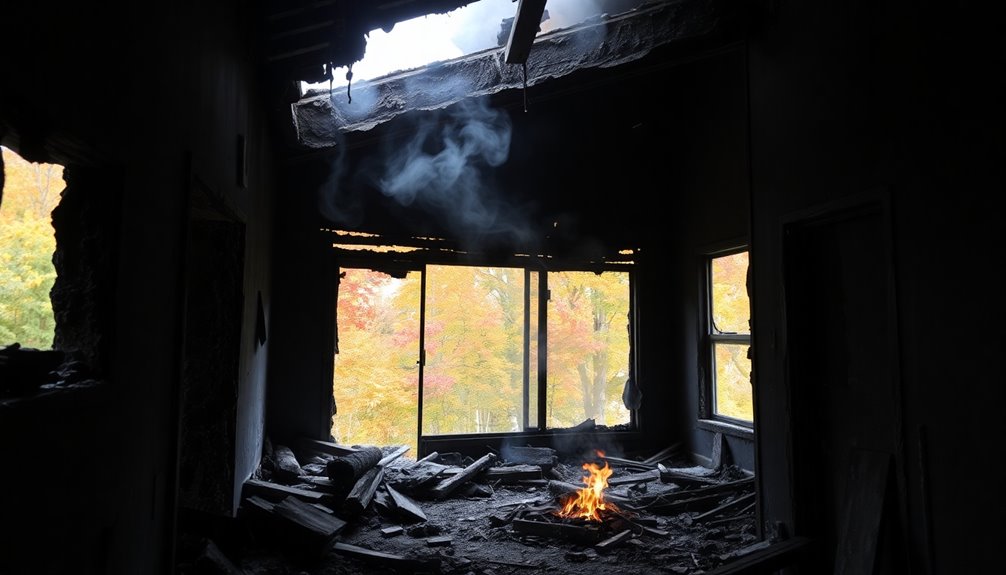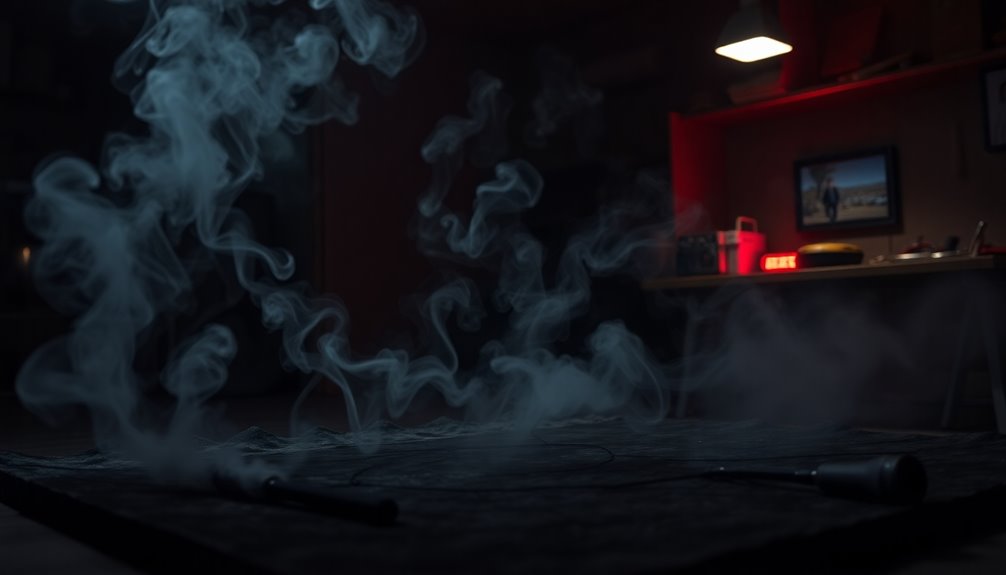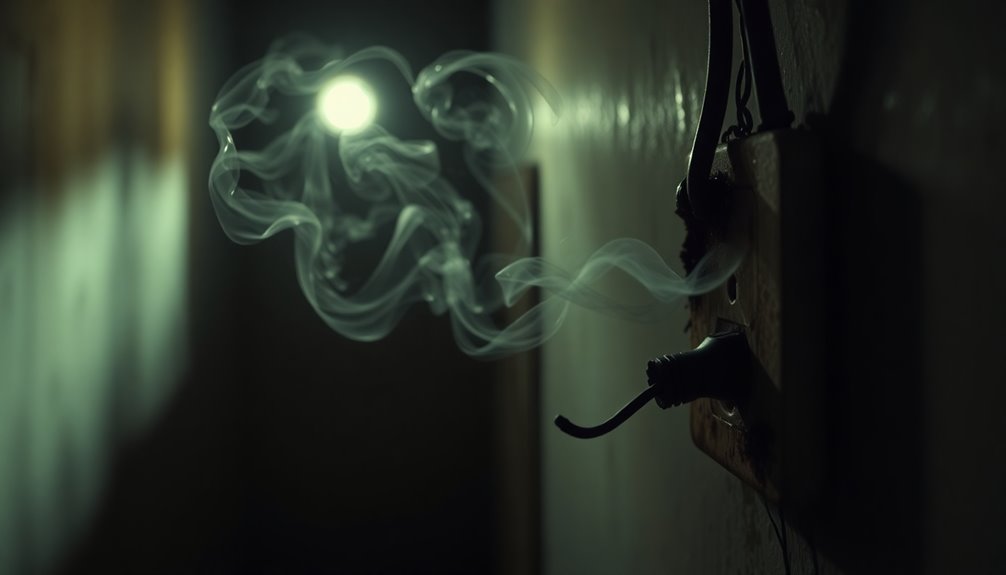A house fire smells sharp and acrid, with a stinging odor that's hard to ignore. You'll notice the scent of burning wood, often mixed with chemical aromas from melting electrical insulation and plastic. If you catch a whiff of sweet or pungent scents, that might indicate insulation burning or an electrical fire. Lingering smells can signal hidden dangers, while thick, dark smoke usually means a serious risk to air quality. This unsettling smell can trigger fear and urgency, reminding you of fire safety. If you're curious about the health risks it poses, there's more to discover.
Key Takeaways
- A house fire typically emits an acrid smell from burning materials, often resembling melting plastic or rubber due to electrical insulation burning.
- Sweet, pungent scents combined with chemical aromas may indicate burning insulation or electrical fires, signaling immediate danger.
- The smell of burnt wood mixed with ash reflects structural damage, while fishy or chemical scents suggest synthetic materials are burning.
- Lingering odors after a fire can indicate hidden damage or smoldering materials, posing ongoing health risks and potential hazards.
- Detecting these smells can prompt immediate evacuation, as they often signal the presence of harmful chemicals and respiratory risks.
Introduction
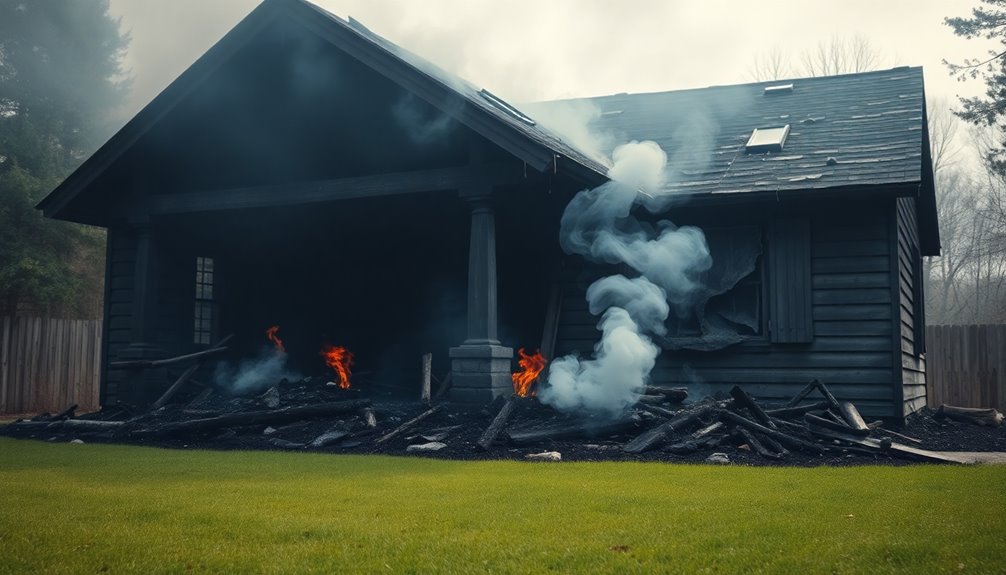
When you think about a house fire, the smell is often one of the most alarming aspects. You might encounter burning plastic or rubber, which emerges from the combustion of insulation materials and various household items. This acrid scent can signal danger, especially if you also smell a fishy odor, indicating melting insulation from electrical wiring. These are crucial signs of an electrical fire developing in your home.
As smoke fills the air, it carries a strong, unpleasant smell that becomes increasingly difficult to ignore. You should never underestimate the importance of smoke detectors; they're your first line of defense. If you ever notice electrical burning smells or chemical odors, don't wait. These could be signals of overheating appliances or wiring that could lead to a serious fire hazard.
Lingering smells of smoke after an incident might indicate ongoing risks, making it essential to consult a professional electrician for an evaluation. Prioritizing electrical safety is crucial, as it can save lives and property. Recognizing these smells can help you act quickly to protect yourself and your loved ones from potential fire hazards.
Description of the Smell
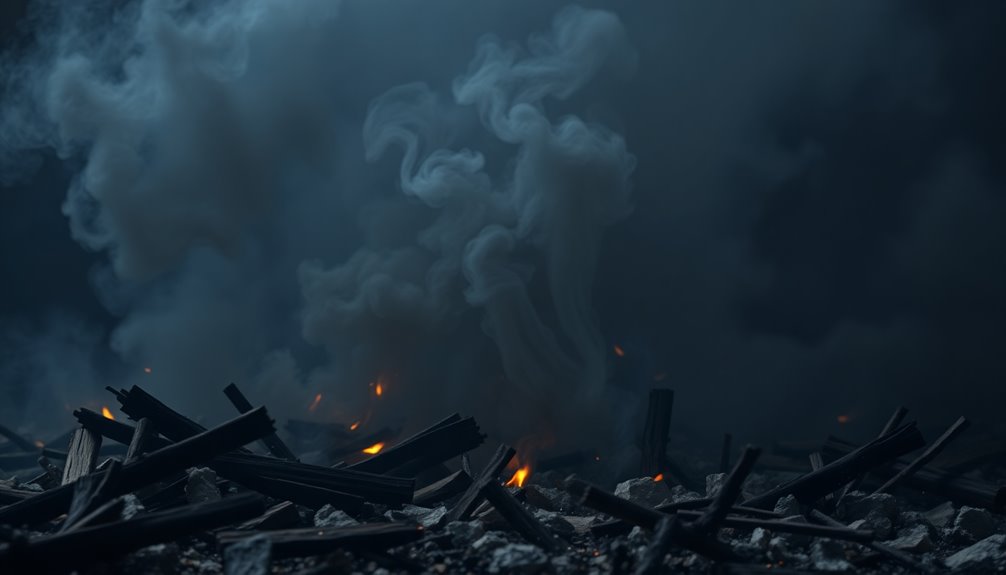
The smell of a house fire hits you with an acrid intensity that's hard to ignore. It's a mixture of burning materials, often overpowering and disorienting. You might recognize the sharp scent of melting electrical insulation, which carries a fishy odor, hinting at a potential electrical fire hazard. As you inhale, the smoke wraps around you, its sweetness combined with a chemical-like aroma that's unsettling, especially if electrical components are involved.
As the fire rages, the smell intensifies, transforming into a heavy, burnt wood scent mixed with ash. It's a reminder that furniture and structural elements are succumbing to the flames. You can almost taste the bitterness in the air, a stark contrast to the warmth of the fire.
Even after the flames subside, lingering odors can cling to your surroundings, indicating hidden damage or smoldering materials just waiting to reignite. These persistent scents emphasize the importance of professional evaluation to ensure safety. In this chaotic olfactory landscape, every whiff tells a story of destruction and the need for vigilance.
Source and Composition
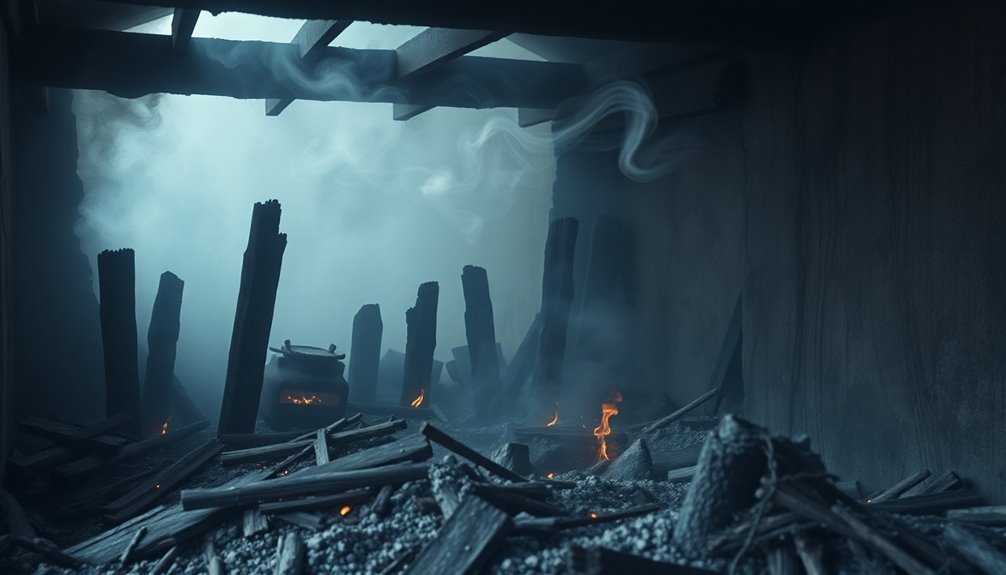
Understanding the source and composition of the smell produced during a house fire reveals much about the materials involved in the combustion process. The acrid smell you notice often resembles burning plastic or rubber, which comes from the combustion of insulation and electrical wiring. As wood, textiles, and various household items burn, they release a complex mix of chemicals, including volatile organic compounds (VOCs), contributing to that unmistakable smoke odor.
The presence of synthetic materials significantly alters the smell; a fishy or chemical scent indicates burning plastics. As the fire progresses, the odor intensifies, often becoming more pungent and mixed with the smell of charred organic matter. This change in odor signals an increasing danger and highlights the fire's destructive power.
It's crucial to recognize that smoke from house fires contains harmful substances like carbon monoxide, formaldehyde, and benzene, which pose significant health risks upon exposure. Understanding the source and composition of the smell can help you grasp the potential dangers of the materials burning and the urgent need for safety measures during a fire situation.
Typical Scenarios or Environments
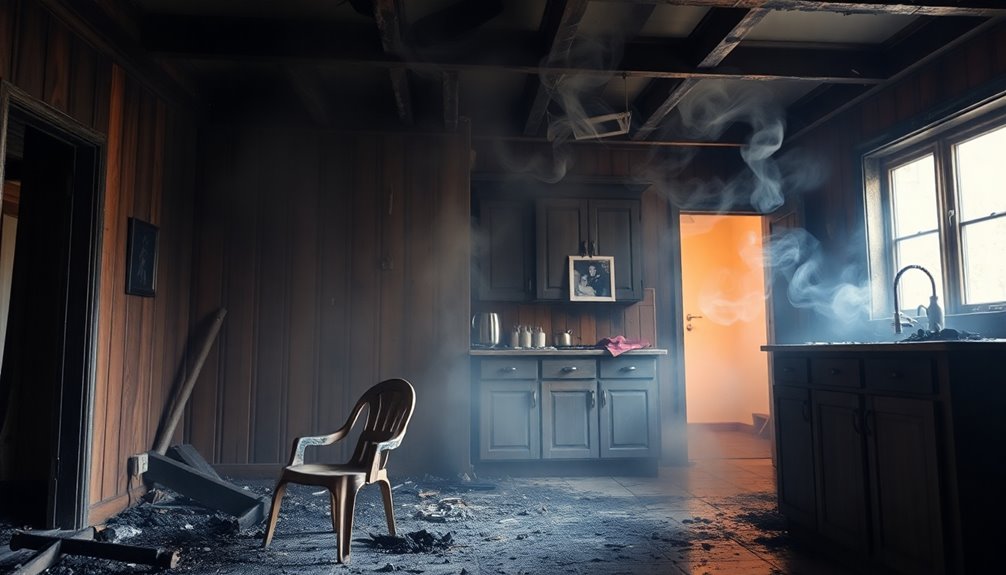
House fires can erupt in various scenarios, each producing a unique smell that reflects the materials involved. If a fire starts due to faulty electrical systems, you'll likely notice a burning odor resembling melting plastic or rubber. This scent comes from the electrical wiring and insulation surrounding the components. In some cases, the smell may even have a fishy undertone, indicating overheated electrical parts or melting insulation.
As the fire spreads, acrid chemical fumes fill the air, released from burning household items, which can pose significant health risks. The smoke often appears thick and dark, signaling incomplete combustion of materials inside your home. This not only affects the air quality but also signifies potential property damage.
After a fire, lingering smells serve as a warning of ongoing risks that may still be present in your environment. It's crucial to consult professionals for evaluation and restoration services to ensure your safety. Ignoring these odors might lead to further complications or exposure to harmful residues. Understanding these typical scenarios can help you identify the risks and take necessary precautions.
Emotional or Cultural Associations
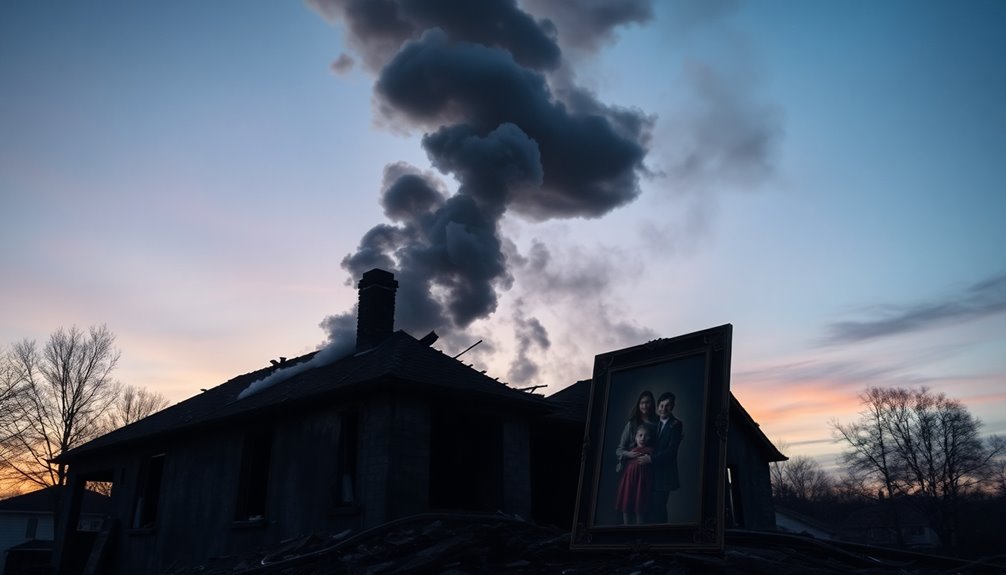
Many people associate the smell of a house fire with feelings of fear and urgency. It's an acrid scent that often brings to mind the dangers of flames, especially if you've ever experienced an electrical fire. The smell of smoke can trigger memories of loss and destruction, leading to an emotional connection that runs deep within those who've faced the signs of a fire firsthand. Cultural narratives surrounding fire further amplify these sentiments, framing the smell as a reminder of tragedy and fragility of safety.
For many, the odor of charred wood or burning plastic evokes reflections on resilience and recovery. Survivors often find themselves navigating a complex emotional landscape—where the smell symbolizes both devastation and the strength to rebuild. Additionally, the importance of safety and fire prevention becomes apparent, with the need for fire extinguishers and early-warning systems underscored by the haunting reminder of past experiences. Ultimately, the smell of a house fire serves as a powerful marker of human emotion, intertwining loss with the hope of recovery, and reshaping how we perceive safety in our homes.
Health or Safety Considerations
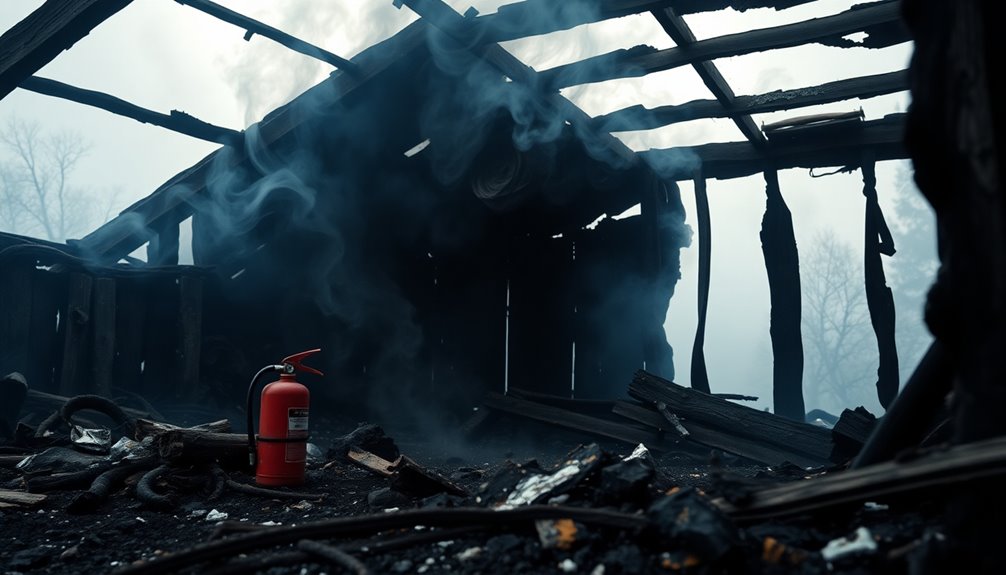
The emotional weight of a house fire isn't just about memories; it also brings real health and safety concerns. The smell of burning plastic or rubber indicates harmful chemicals like ketones and aldehydes in the air, which pose serious health risks upon inhalation. Prolonged exposure can lead to respiratory issues, making immediate evacuation essential.
Electrical fires can escalate rapidly, reaching temperatures of up to 1100°F within minutes, increasing the risk of smoke inhalation and burns. Recognizing warning signs, such as flickering lights or unusual smells, is crucial in preventing an electrical fire caused by faulty wiring.
To enhance your safety, it's important to take proactive measures, like installing functioning smoke detectors. These devices alert you to danger, allowing for a quicker response. If you smell smoke, don't hesitate to call the fire department. The presence of smoke not only indicates a fire but also contains harmful fine particulate matter. Prioritizing immediate evacuation can save lives and reduce health risks. Remember, being prepared and aware can make all the difference in a crisis.
Final Thoughts
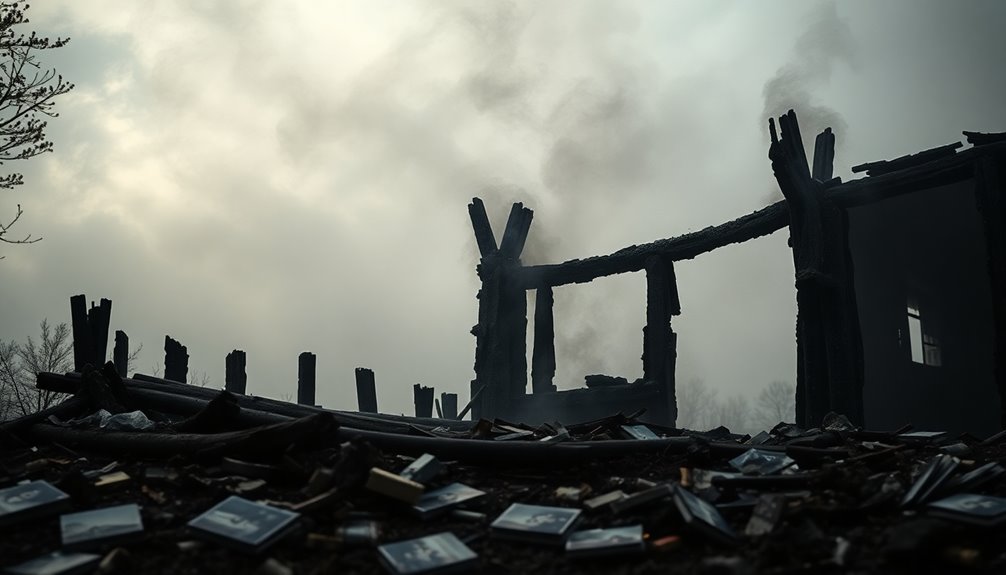
Experiencing a house fire can be devastating, leaving lasting emotional and physical scars. The burning smell of a house fire is not just unpleasant; it's a warning sign that shouldn't be ignored. Distinct odors, like acrid smoke or even a fishy scent, can indicate serious issues, often stemming from melting insulation or outdated wiring. If you notice a persistent burning smell, evacuate immediately and seek professional help, as it may signal an ongoing electrical fire.
To reduce the fire risk in your home, it's essential to implement preventative measures. Regular inspections of your electrical systems can help catch potential hazards before they escalate. If you're unsure about the condition of your wiring or detect strange odors, don't hesitate to contact an electrician. They can diagnose electrical issues that might lead to a house fire and provide solutions to keep your home safe.
Frequently Asked Questions
How Does Fire Smell Like?
When you think about how fire smells, it's a mix of acrid and burnt aromas. You might catch hints of melting plastic or rubber, especially if synthetic materials are involved. As the flames consume wood, you'll notice that distinct charred scent. Depending on what's burning, the odor can shift—furniture gives off one smell, while electrical fires might produce a more chemical-like odor. It's a complex and often overwhelming combination of scents you won't easily forget.
Why Does My House Smell Like Fire but No Fire?
If your house smells like fire but there's no visible flames, it's essential to investigate. You might be dealing with burning insulation from faulty wiring, overloaded circuits, or dust on heating elements. Malfunctioning appliances can also produce acrid odors that resemble smoke, signaling a potential hazard. Don't ignore these smells; they could indicate hidden dangers. Regular maintenance and inspections can help prevent serious issues and keep your home safe.
How Would You Describe the Smell of a House Fire?
You'd describe the smell of a house fire as incredibly harsh and unpleasant. It hits you with an acrid, sharp scent, reminiscent of burning plastic or rubber. As smoke builds up, the odor becomes heavy and pungent, lingering long after the flames are gone. Depending on what's burning, you might catch hints of a burnt, fishy smell or strong chemicals if electrical components are involved. It's a smell you won't easily forget.
What Does an Electrical Fire Smell Like Before It Starts?
Before an electrical fire starts, you might notice a sharp, acrid smell that resembles burning plastic or rubber. If you detect a fishy odor, it's a sign that insulation is melting, and you should act quickly. Chemical smells indicate overheating wiring or appliances, while a persistent burning scent without visible flames suggests ongoing electrical issues. If you notice any of these odors, it's crucial to seek professional evaluation immediately. Your safety depends on it.
